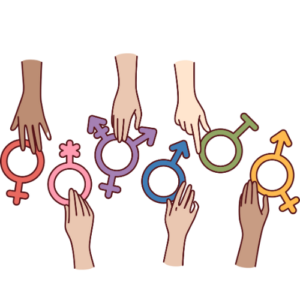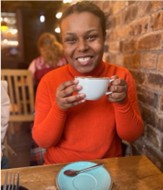
“Our Realities: Stories of Resilience from Black, LGBTQ+, and Disabled Lives”
Introduction to Our Four-Part Series: Honouring Intersectional Stories.
Hi! I’m Erykah. Growing up in a predominantly white area of the West Midlands as a Black, bisexual, and disabled woman, the journey to accepting my identities has been (and continues to be) a challenge. Embracing my multifaceted identity has often felt like an uphill struggle, especially as resources and conversations have tended to focus on each aspect of identity in isolation, rather than recognising how they intersect. This lack of dialogue left me feeling isolated in my experiences, as though I were alone in navigating these complexities.
But I’ve since learned that I am far from alone. Conversations with Tamsin, Rory, Femi, and Loushaé—four individuals who have courageously shared their stories for this series—have been profoundly illuminating. Their insights have shown the power of connection and storytelling, revealing the ways our identities are interwoven and reminding us that our struggles and triumphs are deeply valid. As we move from Black History Month into Disability History Month, it feels more important than ever to celebrate and uplift these voices.
This four-part blog series will explore into their personal journeys and the ways their Blackness, queerness, and disabilities intersect. Through their narratives, we’ll examine the challenges they face, the resilience they demonstrate, and the strength they embody. The first story comes from Tamsin, who shares their experiences as a queer, non-binary, disabled Black person living in southeast London. Tamsin’s journey highlights the significance of finding spaces that embrace every aspect of one’s identity, while also shining a light on the challenges of navigating healthcare systems and advocating for oneself.
Their story is not just about the difficulties they’ve faced but also about the joy and sense of belonging they’ve found in their community. Tamsin’s perspective is a powerful reminder of the importance of intersectional representation and why these stories deserve to be shared and celebrated.
T– “My name is Tamsin. I’m 38. My pronouns are they/them…my background… Is that sort of culturally?” [laughs]
E– [laughs] “I knew this question would come up; it always does when you as non-white people this question. [laughs]. Let’s start with where you live now & then, where you family come from.”
T– [laughs heartily] “I currently live in Southeast London, Lewisham and my family come from South Africa.”
E- “Nice, so is there anything else you want to tell us about your background?”
T – “Well…I wasn’t born here. I’m South African as well. Came here when I was, around 9 years old. Yeah, I’m probably not considered to be the most African South African because there is a complex history in South Africa [when it comes to racial identity]. Apartheid was a different experience for me. My family is particularly mixed (with Asian, African and European ancestry). In South Africa they called us ‘coloured,’ and for a long time this is what has made me up. When I came here, people told me that I was ‘mixed race,’ but that didn’t sit right with me… there were a lot of complex experiences for me growing up.
E- Can you share with me your experience of being queer black and disabled, Tamsin?
T- “It took a long time for me to find my queer identity, to be comfortable with it and proud of it. It’s because I never felt like, on the gay scene, that I vibed with certain things. In the beginning, there was this whole this about study ‘firmness.’ If you were masculine presenting, there was a certain way that you had to act, especially when you were pursuing women. For me, who’s attracted to masculinity and femininity (cis, trans, non-binary, it doesn’t matter), was very hard to be non-binary when you were assumed to be an outright lesbian. I only started getting comfortable in being non-binary when I join the [Black Thrive LGBTQ+] Working Group. Being in the Working Group is a really restorative place for me – No matter what we’re doing, as long as I’m with my queer people, especially, I feel at home.”
“Being black and disabled are things that are still challenging for me mainly because of the amount of self-advocacy [I’ve had to do] in healthcare settings. I have arthritis, lymphedema and ulcers on my legs; accessing (and being disappointed by) services/the people who run them, departments not communicating with one another… the fight is exhausting. Never mind mentioning I’m non-binary, they don’t understand. I don’t really go outside unless I have appointments. If I have a social event or something, it takes a lot of preparation.”
“Being black is especially difficult, especially being black and dealing with the NHS. I often have bad experiences with black medical professionals (especially older black women), who devalue my disability by using my race as an excuse. ‘Why are you always acting sick?’ ‘You too ______ to be sick!’ ‘You not sick, you lazy!’ Implicit bias seems to run deep, I think it has link to colonialism; they like to see their girls as strong, so strong that they unsurprisingly collapse under the pressure. I’m very fortunate to have my mum and my sister be such strong advocates for me. They make the challenges of my identity slightly more tolerable.”

E – Are there any services or support groups that you find helpful?
T– “Black Thrive is a place that I’ve found I can get support from & you know, meet other people who are queer or who have a long-term illness. There aren’t many spaces (if any) that cater to all three of my identities; it’s made it so that many black queer and disabled people may not be able to find themselves within each identity. I have a friend, she has. A disability and she queer. I always knew (the closet was glass) but for a very long time, she lacked the space to express her queerness. I never judged her for this, never.
E- How does the future look for you and for others like you?
T– “For me? Well, I recently tried CBT Therapy which was the best thing I have ever done for myself. It was so revolutionary to reflect on the things I’ve picked up on as a child and how they’ve informed my adulthood. The future for me looks amazing. I’m going to write about things, my own experiences. For people like me, I think queerness is the future. I once was told that if you’re a woman, black and queer you’re disabled, you’re at the bottom of society. You’d more even future down if you were fat, had darker skin, tight curls etc… But soon I think this will change. We will be loved, celebrated and appreciated.
E- Is there anything you want others to know about being disabled?
T– “We’re here! People should always try and connect with their disabled friends and family members, just to check in. Sure, were not going to be the best every day but you know, still include us in things, speak to us. It’s so easy to do and so appreciated by us, even if we’re too unwell to receive it.
E- Lastly, as this four-part series is in recognition of Black History and Disability history months, do you have anything to say about that?
T– “We get a month for each thing, but really, people should be like, talking and connecting throughout the year. Blackness isn’t going away, and disabilities don’t just appear once a month [laughs] Lets celebrate all the people in our communities that may not get the recognition they deserve. Like my mum. She has been working in the NHS for years as a neonatal nurse, she works with small babies. The things that she has done throughout her career and in other parts of her life. Its inspiring. I honestly wouldn’t know who I’d be without her. So yeah, celebrate the unsung heroes.”
E– “Honestly, having these conversations has been such a meaningful experience. For a long time, I think people avoided these topics, or perhaps couldn’t fully believe the complexities of them. Hearing these stories fills me with so much hope and happiness. It’s incredible to see how we’re moving forward, learning to reflect inwardly, and relying on those around us. I genuinely love this. Thank you so much for sharing your time and experiences with me Tamsin—I really appreciate it.”
About the Author
Erykah Williams-McIntosh (she/her) is a passionate advocate and Project Officer for the Black Queer & Thriving Programme. As a Black, LGBTQ+, and disabled woman, Erykah uses her platform to amplify voices and share stories that often go unheard. Erykah believes in the power of storytelling to create inclusive spaces and spark change, one post at a time.







Read recent articles
Coming out is a weird one, isn’t it?
The Double Rainbow
“Queerness is African!” – Challenging Myths & Misconceptions
Chosen Families and Shared Struggles: Rory’s Story